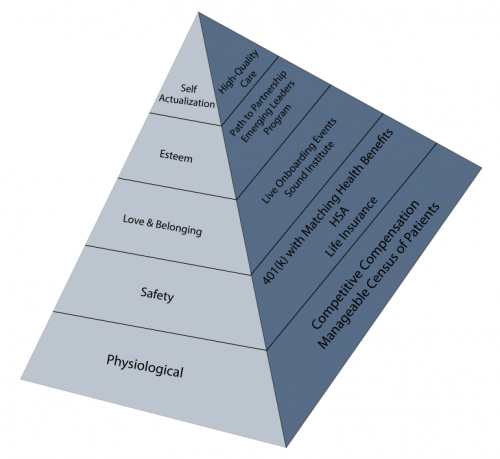January 19, 2018
Taking a Career Leap

Foreword by Lynn Purdy, Vice President of Communications and Marketing You’d think a medical director with clinical responsibilities for a 30 physician and 6 advanced practice provider hospitalist team, coupled with a calendar full of committee meetings ranging from Medical Executive to Utilization Review and Peer Review, was well on his way to an executive hospital leadership career. Add to those duties the management of an 18-bed observation unit and physician advisor responsibilities for good measure. He’s not one to be okay with the status quo for long. He completed a Master in Public Health degree from Johns Hopkins Bloomberg School of Public Health and is currently pursuing a Master in Business Administration from Indiana University. Still early in his career, he has already authored more than 25 health technology assessments, is the author for 20+ peer-reviewed publications and racks up more than 2,300 citations if you look him up in Google Scholar. So why in the world did this very accomplished, upward-climbing physician decide to make a major career leap to become a Sound Physicians Ambassador? The role of the Ambassador provides an incredible opportunity to see healthcare from a variety of settings and communities. Ambassadors work in a variety of hospitals across a region to provide support and implement best practices. Unlike locum tenens physicians, they have a special assignment to implement best practices that drive improvements in quality, patient experience of care and efficiency. As special agents, they often work on a hospitalist team for several weeks or months and then move on to their next assignment. As you will read, he took a very methodical approach to looking at his career options – read on to learn more..
From rural hospitalist to Sound Physicians Ambassador
My work as a rural hospitalist in Mississippi ended recently when I resigned from my leadership position and started my career as a Sound Ambassador. As I announced my decision to my colleagues and friends, they were perplexed. Many wondered why I would take a role as a boots-on-the-ground hospitalist, traveling from city to city with new assignments on a rotating basis. Even my wife was puzzled by my decision. Most people surmised I was anxious to leave the rural lifestyle and would do anything to move back to a metropolitan city. While there was some truth to that, my decision was much more deliberate and my motivation clear. I am a researcher and life-long learner. The Sound Ambassador career offered me a chance to study many health systems, understand how they function and provide process improvements when change is needed. Becoming an Ambassador could be a great learning adventure where I could wear many hats – provider, researcher, teacher, coach and leader. Before making the final decision, I needed to know I was making a move motivated by a clear internal need to take the next step in my career, even if it seemed unconventional to some. After conducting a careful review of my options, I applied Maslow’s Hierarchy of Needs using fundamental motivational theory to analyze my decision.
A Review of Maslow’s Hierarchy of Needs
In 1943, Abraham Maslow proposed a model which stated that people are motivated to achieve certain needs, and some take precedence over others. As we learned in medical school, our most basic needs are physiological, like food, drink, shelter and sleep. Once these are satisfied, individuals progress towards safety needs like law and order, security and freedom from fear. Subsequently, a desire to grow as a person leads people towards love and belonging needs like friendship, intimacy and being part of a group. These progress to esteem needs like dignity, achievement and desire for respect from others. Finally, a desire ‘to become everything one is capable of becoming’ is reflected in self-actualization needs. Here’s how I tested the Sound Physicians practice model against the Maslow’s model to determine whether this change will be the right fit for me:
Testing the Model
- Physiological Needs: Sound makes every effort to make sure that physicians have a manageable census, while ensuring alignment with the organizational objectives of its partner hospitals. The compensation is extremely competitive in all markets where Sound operates.
- Safety Needs: Top-tier retirement plans and health benefits with sophisticated health savings accounts ensure that not only Sound colleagues, but also their loved ones, are taken care of.
- Love and Belonging Needs: Every Sound provider is welcomed to a live onboarding event to learn about the organization’s vision, mission and values and connect with providers from all across the nation. The Sound Leadership team has a consistent presence at these events to meet and greet new providers. At onboarding, providers are introduced to resources like the Sound Institute technology platform, with access to the organization’s rich history, archives of previous meetings, and tons of educational material, including CME content, as well as the Knowledge Center, Sound’s expansive intranet site.
- Esteem Needs: Sound offers structured programs for professional growth, such as the Path to Partnership and the Emerging Leaders programs, to help those who want to move into leadership get the mentorship and training needed. Colleagues have ample opportunities for growth within the organization and are rewarded for their hard work, diligence and talent.
- Self-Actualization Needs: I found Sound to be at the forefront of innovation and pushing the boundaries of advancement through its performance management model. Ultimately, Sound supports its colleagues to fulfill their desire to contribute meaningfully to individual patients, in the communities they serve and ultimately impact the country’s healthcare system overall.
I was somewhat surprised at my findings as I took a hard look at the role of the Ambassador through Maslow’s lens. It was then I realized how well the role aligned with my values and path to self-actualization. So, as crazy as it might seem from the outside looking in, that’s how I decided to take this leap of faith to become an Ambassador physician. In the coming months, I’ll be sharing my experiences from this new living-learning lab in future blog posts. Until next time!
